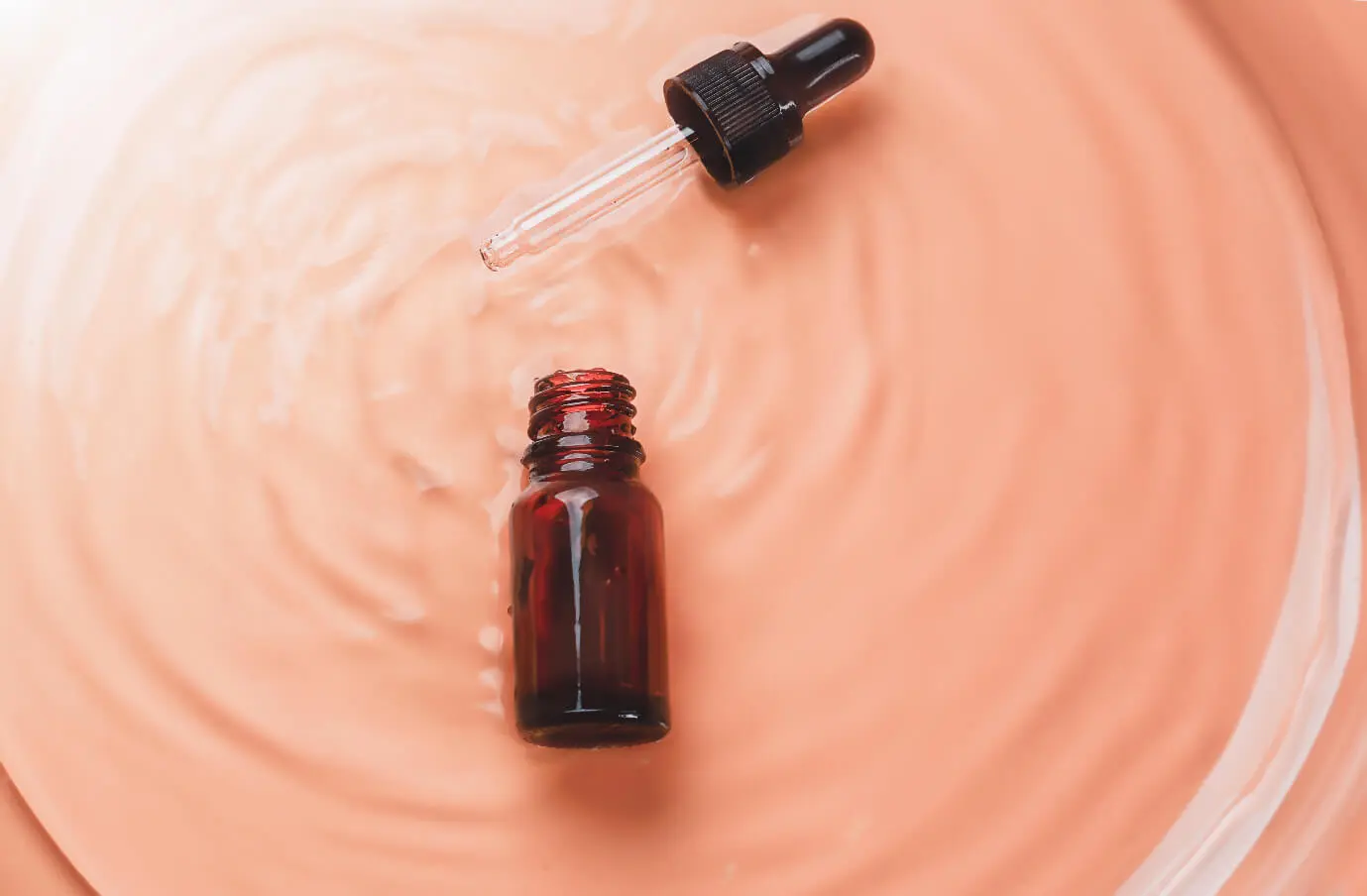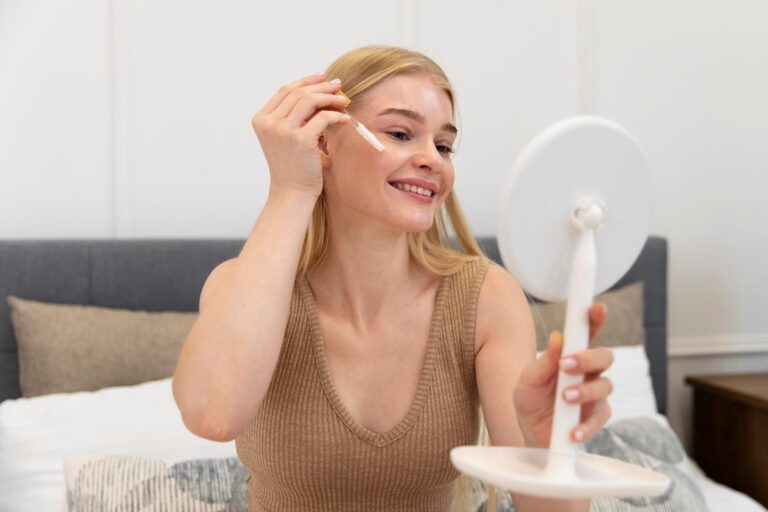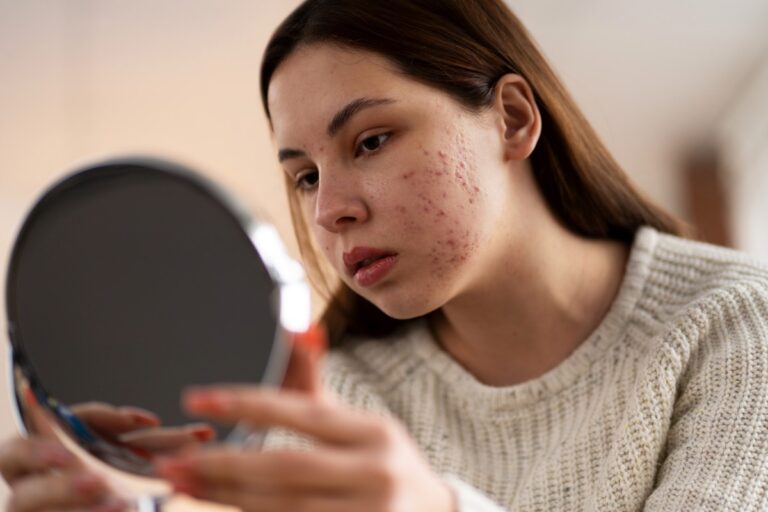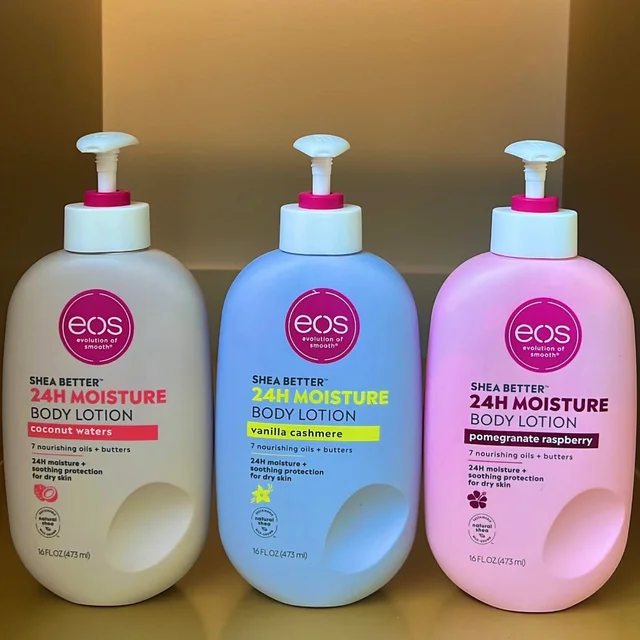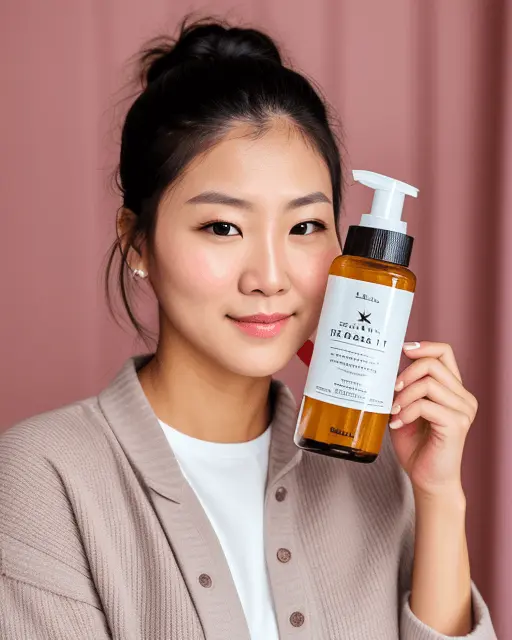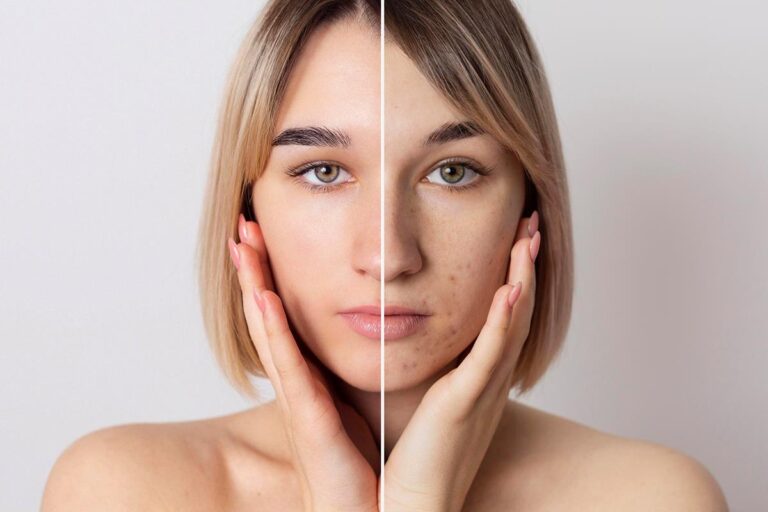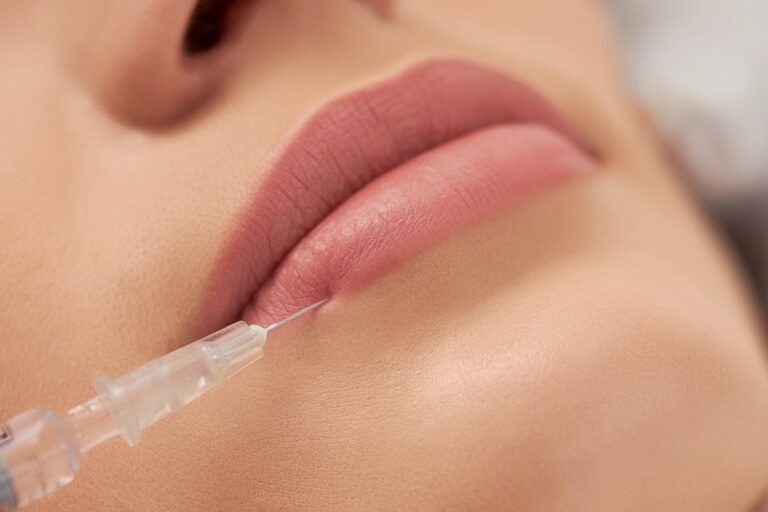Copper Peptides for Skin—All Benefits You Should Know
Copper peptides are small protein fragments that significantly impact skin health, known for boosting collagen and elastin production. These ingredients, found in many skincare products, enhance skin elasticity and reduce the appearance of fine lines and wrinkles. Incorporating them into your skincare routine can lead to healthier, more youthful-looking skin.
What Copper Peptides Do for the Skin
Copper peptides are small molecules naturally occurring in the body, playing a pivotal role in the skin’s healing processes. They are recognized for encouraging the skin to heal itself, signaling the body to produce more collagen and elastin. These two proteins are the scaffolding of the skin, responsible for its firmness and elasticity.
They don’t just stop at boosting collagen and elastin production. They also act as antioxidants, protecting the skin from damaging free radicals that can accelerate aging. This dual action makes them a favored ingredient in anti-aging skincare formulations.
But the benefits extend further. They have been found to improve skin texture and reduce the appearance of fine lines and wrinkles, giving the skin a more youthful look. By enhancing the skin’s natural renewal process, copper peptides help diminish scars and other imperfections over time.
Another interesting aspect of copper peptides is their anti-inflammatory properties. They can soothe irritated skin, making them beneficial for those with sensitive skin types or conditions like acne and rosacea. This calming effect helps in reducing redness and discomfort associated with skin irritations.
The peptides also play a role in hair health, promoting a healthier scalp and potentially encouraging hair growth by strengthening existing hair follicles. This makes them a versatile ingredient, sought after not only in skincare but in hair care products as well.

Incorporating products with copper peptides into your skincare routine can be straightforward. They’re found in serums, creams, and masks. For best results, consistency is key, as well as paying attention to how they interact with other ingredients in your regimen. Vitamin C, for example, might not work well when used simultaneously with copper peptides due to differing pH levels.
Understanding the concentration of peptides in a product is important, too. Higher concentrations aren’t always better, especially for sensitive skin. It’s advisable to start with lower concentrations to see how your skin reacts before moving to stronger formulations.
What Not to Mix with Copper Peptides
They are celebrated for their skin rejuvenation properties, promoting collagen production and enhancing skin elasticity. However, it’s crucial to use them correctly by knowing what ingredients they should not be mixed with to avoid reducing their effectiveness or causing skin irritation.
Vitamin C is a potent antioxidant that can interfere with the stability of copper peptides. When used together, they can cancel each other out, diminishing the beneficial effects on the skin. It’s best to apply them at different times of the day, perhaps in the morning and the evening, to ensure both ingredients work effectively without interaction.
Similarly, retinol, a form of vitamin A, is known for its anti-aging properties but can react negatively when used with copper peptides. This combination can lead to skin sensitivity and irritation, making it advisable to alternate their use between days or use them at different times.
Direct acids, such as glycolic, lactic, or salicylic acid, can also affect the performance of copper peptides. These acids lower the skin’s pH level, which can degrade copper peptides and reduce their ability to penetrate the skin. To avoid this, consider using acids and copper peptides in separate skincare routines, allowing your skin to maintain its balance and benefit from both ingredients.

It’s essential to pay attention to how your skin reacts to different combinations of skincare products. Everyone’s skin is unique, and what works for one person may not work for another. Starting with a patch test and gradually introducing new products into your skincare routine can help identify any sensitivities and ensure the best care for your skin.
Can You Use Copper Peptides Every Day?
Copper peptides are known for their skin-healing properties and are considered safe for daily use for most skin types. These powerful ingredients work by encouraging your skin to ramp up collagen production, making the skin look firmer and smoother over time.
When starting with copper peptides, gradually introducing them into your skincare routine is wise. This means beginning with a lower frequency, maybe a few times a week, and observing how your skin reacts. If your skin responds well, you can increase the daily usage without worry.
It’s also important to listen to your skin. Some might experience sensitivity or irritation, especially when starting a new active ingredient. Reducing the frequency may help your skin adjust more comfortably if you notice any discomfort.

They can be a great addition to both morning and evening skincare routines. However, spacing them out to avoid interactions is crucial if you combine them with other active ingredients. For example, you might use copper peptides in the morning and acids or retinol at night.
The key to using copper peptides or any skincare product is consistency. Regular use is essential to see noticeable skin texture, firmness, and overall appearance improvements. Patience and consistent care will help you achieve the best results.
The main objective of skin care is to provide adequate support and nourishment to your skin. If you ever feel unsure about introducing a new product or ingredient into your routine, consulting with a dermatologist can provide personalized advice tailored to your skin’s needs.
At What Age Should You Start Using Copper Peptides?
There’s no strict age to begin using them, but they are generally considered beneficial as part of an anti-aging strategy starting in your late 20s to early 30s. This timing aligns with when the body’s natural collagen production begins to slow down, and early signs of aging, such as fine lines, may start to appear.
Early copper peptides can help preemptively address these changes, supporting the skin’s integrity before significant aging signs become evident. However, if you’re younger and facing skin issues like acne scars or uneven texture, copper peptides can also be helpful due to their healing properties.
For those in their 40s and beyond, copper peptides can offer significant benefits by enhancing skin thickness, reducing the appearance of wrinkles, and improving overall skin health. At this stage, your skin can greatly benefit from copper peptides’ reparative and regenerative properties.
Ultimately, the right time to start using them depends on your skin’s specific needs and your goals for your skincare routine. Whether you’re looking to maintain your skin’s youthful appearance, address specific concerns, or give your skin a rejuvenating boost, copper peptides can be a valuable addition at almost any age.
Listening to your skin and adjusting your skincare routine as you age is crucial. If you’re unsure about the best time to incorporate copper peptides or how they fit into your existing routine, consulting with a skin care professional can provide guidance tailored to your unique skin type and concerns.
How Can Copper Peptides Help with Scar Reduction?
These play a significant role in skin healing and rejuvenation, which extends to their ability to help reduce the appearance of scars. They are known for their powerful skin remodeling properties, making them an excellent choice for anyone looking to diminish scars.
These peptides support the production of collagen and elastin, two critical components of the skin that contribute to its elasticity and firmness. When scars form, they can disrupt the normal structure of collagen and elastin in the skin. Copper peptides can promote the synthesis of essential proteins that help normalize the skin’s texture and reduce the visibility of scars.
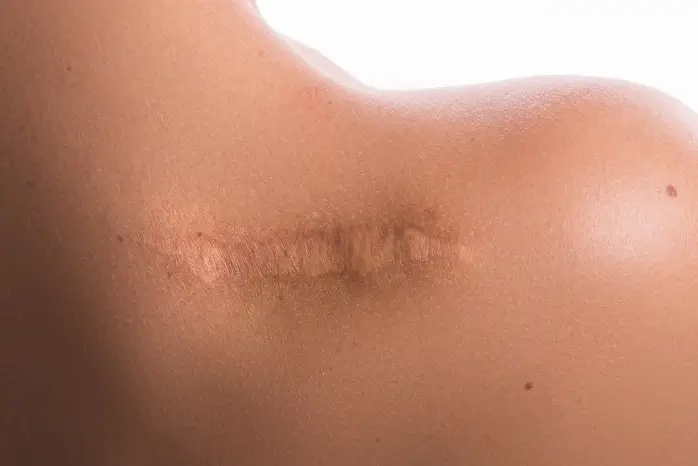
Copper peptides possess anti-inflammatory properties that effectively calm the skin and minimize redness surrounding scars. Also, copper peptides possess anti-inflammatory properties, which can soothe the skin and alleviate the redness around scars. This is particularly beneficial for new or healing scars, as inflammation can exacerbate scar appearance and hinder healing.
They also encourage removing damaged proteins and stimulating the production of new, healthy skin cells. This turnover process is crucial for reducing the appearance of scars, as it replaces scarred tissue with fresh, unblemished skin over time.
Incorporating products containing copper peptides into your skincare routine can be a strategic approach to scar reduction. It’s essential to be patient and consistent with their use, as the process of diminishing scars gradually requires time for the skin to heal and regenerate.
For those dealing with acne scars, surgical scars, or other types of skin blemishes, copper peptides can offer a non-invasive solution to improve skin appearance. Their ability to support the skin’s natural healing processes makes them a valuable tool in the quest for clearer, smoother skin.
Are There Specific Copper Peptide Products for Different Skin Types?
Copper peptide products are versatile and cater to various skin types. Whether your skin is oily, dry, or somewhere in between, there’s likely a copper peptide product that fits your needs.
Lightweight serums containing copper peptides can be a great choice for those with oily or acne-prone skin. These formulas are designed to absorb quickly without leaving any greasy residue that could clog pores or exacerbate oiliness.
Dry skin types might prefer copper peptide creams or lotions. These are often enriched with additional moisturizing ingredients to help nourish and hydrate the skin, all while delivering the benefits of copper peptides.

Sensitive skin requires a bit more caution. Products formulated specifically for sensitive skin, including copper peptides and soothing ingredients, can help minimize potential irritation.
Combination skin types have the flexibility to customize their use of copper peptide products. Targeting different products to specific face areas can balance out the varying needs of dry and oily zones.
It’s an excellent practice to patch-test any new product before applying it to your skin, regardless of skin type. This step ensures you don’t have an adverse reaction to the formula’s copper peptides or other ingredients.
Conclusion
Copper peptides significantly impact skin health, stimulating collagen and elastin production to enhance skin elasticity and diminish aging signs. These benefits make them suitable for individuals of any age seeking to improve their skin’s appearance. With applications ranging from scar reduction to anti-aging, copper peptide products cater to various skin types, showcasing their versatility and effectiveness in skincare routines.
